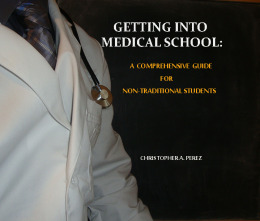The Non-Traditional Pre-Med Student Effect
 Guest post by Christopher A. Perez
Guest post by Christopher A. Perez
Pre-medicine as we currently know it has to change.
I’m not talking about the required courses that have to be completed or the ultra-important MCAT. I’m referring to the notion that pre-med students must carry a full load of classes every semester in order to demonstrate to medical school admissions committees that they can “endure a rigorous schedule of classes”. Commonly, pre-med counselors advise students that they must take 16-18 credits a semester and for many students it’s just not possible.
The traditional student who attends a four-year university directly after high school is not as common anymore. Many students work because they don’t have the financial luxury to only concentrate on school while other students choose to first attend a community college because the cost of tuition is considerably cheaper. Then, there are also career changers. Career changers are students who already have a career but have decided to return to school in hopes of learning a different field then what they have previously studied. According to the National Center for Education Statistics (NCES), nearly three out of four college students are considered non-traditional (Choy). It is the single largest category of college students today. What makes up a non-traditional student? The NCES states that anyone who satisfies one of the following criteria is considered a non-traditional student:
- Delays enrollment (does not enter postsecondary education in the same calendar year that he or she finished high school);
- Attends part-time for at least part of the academic year;
- Works full-time (35 hours or more per week) while enrolled;
- Is considered financially independent for purposes of determining eligibility for financial
- Has dependents other than a spouse (usually children, but may also be caregivers of sick or elderly family members);
- Is a single parent (either not married or married but separated and has dependents), or
- Does not have a high school diploma (completed high school with a GED or other high school completion certificate or did not finish high school) (Choy).
Getting into medical school is highly competitive and it’s time to level the playing field for all pre-meds, not just the “traditional” students. A student who excels academically whether they attend college part-time or first attended a community college should be placed in the same regard as the “traditional” pre-med student with the same academic statistics. The pre-medical community must remove all negative sentiments of “part-time” and “strength of class” (à la community college versus university courses) and adopt the idea of universal uniformity instead. This will expand the pool of suitable medical school candidates, increasing the competitiveness of getting into medical school which would ultimately benefit medical schools. It will also diversify the profile of matriculating students that are entering medical schools.
Guest post by Christopher A. Perez
Author of Getting into Medical School: A Comprehensive Guide for Non-Traditional Students
Choy, Susan. “Nontraditional Undergraduates.” National Center for Education Statistics. NECS 2002-12. U.S. Department of Education, 2002. Web. 1 Feb. 2014.





 Post a Comment
Post a Comment

